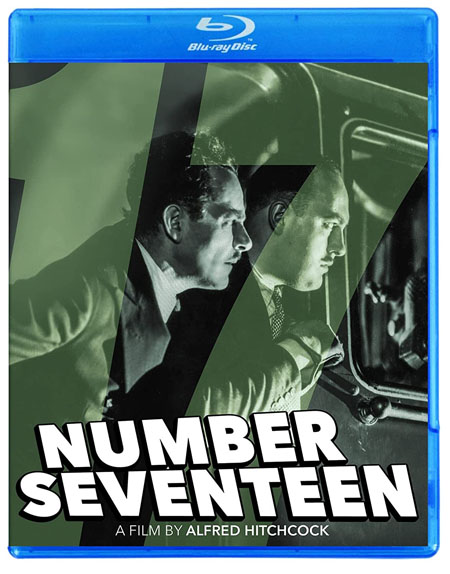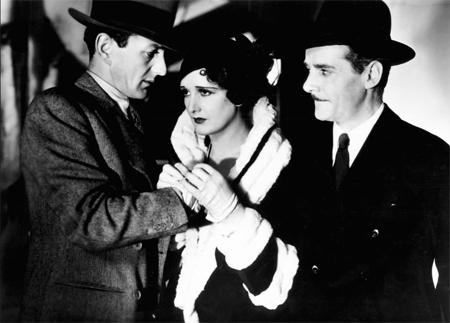
BY RAYMOND BENSON
One
of the great Alfred Hitchcock’s normally derided pictures from his early
British period that the Master of Suspense made prior to gaining that moniker
is the 1932 comic thriller, Number Seventeen. It is a short work,
running only 63 minutes, and its brevity is one of its few strengths.
For
some reason, Hitchcock’s British films, made between 1925 and 1939, have all
turned up on various home video labels in the USA over the years, mostly of
dubious quality ranging from bad to terrible. They often show up on bootleg “bargain
collections†and such. This is despite the fact that none of these movies are
in the public domain, as is commonly thought. Thankfully, certain boutique
DVD/Blu-ray producers have taken the reins to correct this horrid practice.
StudioCanal or the BFI have restored most of the titles and they are slowly
making appearances in America (the UK is way ahead in this regard).
Kino
Lorber has recently released a few of these works, usually port-overs from the
StudioCanal restorations. The new Blu-ray edition of Number Seventeen is
a 4K restoration by the BFI. In this reviewer’s experience, viewing this title
in the past has been an unpleasant endeavor because of poor video and sound
quality on those previously-cited wretched home video releases. Not anymore.
The Kino Lorber edition of Number Seventeen looks and sounds as if the
film is almost brand new.
Alas,
it ranks near the bottom of Hitchcock’s output. The problem—and Hitchcock
himself admits it in an audio interview with François Truffaut—is that
he wanted to make a comedy, or a parody, of a thriller. Unfortunately, it
doesn’t quite work as a comedy or a thriller. The story is mind-bogglingly
confusing, and in the end it’s much ado about nothing. Of particular interest
to Hitchcock aficionados and film buffs, though, is the final twenty minutes,
in which there is indeed an exciting chase involving a train and a bus. This
sequence utilizes miniatures rather than real vehicles, the latter assuredly unaffordable
to the studio and production team. To today’s audience’s eyes, there is no
question that we’re watching many miniatures; it’s as if we’re eye level with a
model train set. In 1932, however, this may very well have been a dazzling
piece of cinematography and visual effects.
The
story? Hmm. The “number seventeen†refers to a house that’s a creepy old place
that appears haunted. A detective, who at first calls himself “Forsythe†(John
Stuart) enters the house and discovers a squatter named Ben (Leon M. Lion). There
is also a dead body, or at least they think it’s a corpse. It turns out, he’s
the very much alive father of Rose Ackroyd (Ann Casson), who is somehow
involved with thieves who are after a diamond necklace. These people arrive,
and one of them is Nora (Anne Grey), supposedly a deaf mute. After much
mistaken identity shenanigans, gun-pulling on each other, and other head-scratching
(for the audience) action, the thieves get away to catch the train to Germany.
The detective, who eventually reveals that he’s really the “Barton†whom
everyone has spoken about throughout the movie, pursues with the aid of Ben,
who is suddenly and surprisingly adept at derring-do.

Since
the whole thing takes up just an hour of one’s time, Number Seventeen is
worth a look to see early studio playfulness by Hitchcock. However, the acting
is nothing to note—Leon M. Lion, especially, chews the scenery with an
outrageous Cockney accent and mugging.
That
said, the Kino Lorber 4K restoration does looks marvelous and is a revelation
to anyone who has seen only inferior quality versions of the movie. The feature
comes with an audio commentary by film historian and critic Peter Tonguette.
Supplements
include an introduction—in French with subtitles—by Noël
Simsolo, which isn’t very enlightening. Of more interest is the
nearly-hour-long documentary—again in French with subtitles (it was made by
StudioCanal in France)—about Hitchcock’s early years. There is also a short
excerpt from the Hitchcock/Truffaut audio interview regarding Number
Seventeen. The theatrical trailer, along with other Kino trailers, complete
the package.
Number
Seventeen is
for fans of Alfred Hitchcock, early British cinema, and for anyone who has
always wondered what the movie was really supposed to look and sound like after
seeing it horribly bootlegged.
CLICK HERE TO ORDER FROM AMAZON